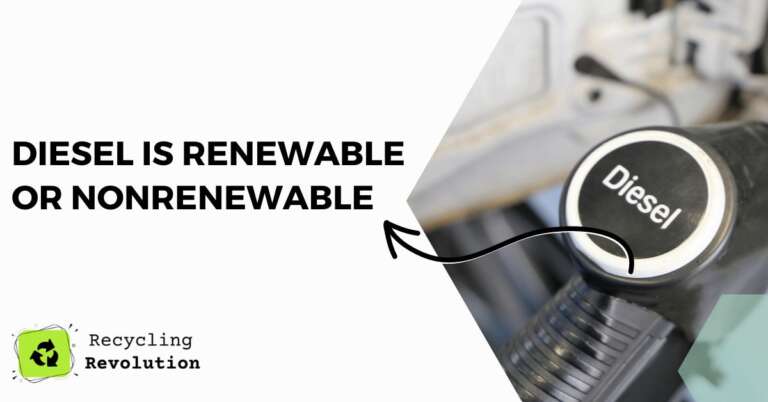Hello passionate energy buffs! Have you ever sat down and pondered, “Is diesel renewable or nonrenewable?” Well, this is your lucky day. Pull up a chair, grab a cup of your favorite beverage, and let’s dive deep into this riveting subject.
TL;DR: Diesel, in its traditional form, is nonrenewable. However, there are newer versions of diesel made from renewable sources.
Diesel has long been a popular choice of fuel, powering everything from our personal cars to massive shipping freighters. But as we inch closer towards a more sustainable future, it’s crucial to understand the renewable status of our resources.
It helps in making informed decisions, both at individual and policy levels.
Diesel Defined: Know Thy Fuel
Traditionally, diesel is a type of petroleum-based fuel derived from crude oil. Crude oil is the remains of ancient plants and animals that have undergone millions of years of heat and pressure. It’s here that our primary question gains clarity.
Crude Oil’s Origin: Being a product of ancient organisms and taking millions of years to form, crude oil is a finite resource. Once we exhaust all available reserves, it’s game over, at least until a few million more years!
I recommend always understanding the origins of a resource before labeling it. In this case, traditional diesel, being derived from crude oil, is decidedly nonrenewable.
BioDiesel: A Glimmer of Renewability
However, there’s a twist in our tale. Enter biodiesel, a fuel made from renewable resources like plant oils and animal fats. Its name may sound like our traditional diesel, but its origin story is quite different.
Production: Biodiesel is typically made through a process called transesterification. This involves reacting fat or oil with an alcohol, producing biodiesel and glycerol.
Renewability: Since the primary ingredients for biodiesel come from plants and animals, they’re replenished every season. This makes biodiesel a renewable resource.
A Comparative Look: Renewable Biodiesel vs. Nonrenewable Diesel
- Emissions: A study by the U.S. Department of Energy’s Argonne National Laboratory found that biodiesel reduces greenhouse gas emissions by 57% to 86% compared to petroleum diesel.
- Efficiency: While biodiesel does have slightly less energy content compared to its petroleum counterpart, modern engines can run on it without any modification.
- Cost: Traditionally, biodiesel has been more expensive than diesel. However, as demand for renewable fuels grows and technology improves, these costs may converge.
I recommend taking a holistic approach when comparing fuels. It’s not just about cost but also about the environment and future availability.
The Diesel Duality
So, is diesel renewable or nonrenewable? The answer: it’s both. Traditional diesel is nonrenewable, while biodiesel is renewable.
Note: It’s essential to differentiate between the two when discussing diesel, especially in contexts related to sustainability or environmental policies.
Future of Diesel
In the current energy landscape, diesel remains a dominant fuel for transportation and industrial applications due to its energy density and widespread infrastructure. However, the environmental impact of traditional diesel, especially its contribution to greenhouse gas emissions, has increasingly come under scrutiny. As a result, there’s a burgeoning shift towards sustainable and cleaner alternatives.
Enter biodiesel: derived from organic materials like vegetable oils and animal fats, it burns cleaner than conventional diesel, releasing fewer pollutants. Presently, biodiesel blends (mixtures of traditional and biodiesel) are becoming more commonplace, providing a transition phase to greener fuels without a complete overhaul of existing engines and infrastructure.
Looking forward, technological advancements promise an even brighter horizon for diesel alternatives. The development of advanced biofuels, synthesized from algae or waste materials, could provide even more efficient and sustainable fuel sources. Furthermore, improvements in production processes, driven by innovations in biotechnology and chemistry, are expected to make biodiesel and its derivatives more cost-competitive.
In tandem, the evolution of engine designs and hybrid technologies might reduce the dependency on diesel altogether. However, despite these strides, it will be a gradual journey before traditional diesel can be wholly replaced, necessitating a balance of innovation, policy-making, and market adaptation.
I recommend staying informed about energy developments and advocating for sustainable choices. Remember, as consumers, our preferences shape the market.
Understanding Diesel’s Lifecycle: From Crude to Combustion
Crude Oil Extraction: This is where it all starts. Crude oil is extracted from the ground using methods like drilling and fracking. The environmental concerns here are numerous, from land degradation to the risk of oil spills.
Refining and Distribution: Post-extraction, crude oil is transported to refineries where it’s transformed into usable products, including diesel. The refining process itself can be energy-intensive, and there’s always the risk of pollution.
Usage and Emissions: When diesel is used as a fuel, it releases carbon dioxide, a greenhouse gas, and other pollutants. While diesel engines are known for their efficiency, they’re also culprits in emitting nitrogen oxides and particulates, harmful to both the environment and human health.
I recommend understanding the entire lifecycle of a fuel when considering its environmental footprint. It’s not just about what comes out of the tailpipe but the entire journey from the ground to the gas tank.
Renewable Diesel: Beyond Biodiesel
Yes, there’s another contender in the renewable arena: renewable diesel. While the names sound similar, their production processes and properties vary.
Renewable Diesel’s Origins: It’s made from the same feedstocks as biodiesel, such as plant oils and animal fats. However, instead of using transesterification, renewable diesel is produced through hydrotreating.
Benefits Over Biodiesel:
- Compatibility: Renewable diesel can seamlessly replace conventional diesel in existing infrastructure without blending restrictions.
- Fewer Emissions: It reduces greenhouse gas emissions even more than biodiesel and offers better performance in cold temperatures.
Note: Renewable diesel, while promising, is still in its growth phase. Availability might be limited compared to biodiesel and traditional diesel.
The Economic Implications
At the heart of the global market lies a crucial tension between renewable and nonrenewable diesels, each with distinct economic ramifications. This tug-of-war is a byproduct of evolving societal values, environmental concerns, and financial interests.
Supply and Demand Dynamics: The ever-fluctuating oil prices directly impact the cost of nonrenewable diesel. Geopolitical tensions in oil-rich regions can create uncertainties, leading to price volatility. An over-reliance on nonrenewable diesel, therefore, introduces economic instability, as nations become vulnerable to supply disruptions and unexpected price hikes.
Subsidies and Incentives: Recognizing the environmental repercussions and the shaky economic foundation of fossil fuels, many governments are championing the shift towards renewables. By offering subsidies and incentives, they aim to make renewable diesels more competitive in the market.
This not only promises a reduction in harmful greenhouse gas emissions but also mitigates the risks associated with dependence on fossil fuels. These strategic economic tools can shift the balance, fostering innovation in renewable diesel technology and encouraging its wider adoption.
I recommend always factoring in the long-term economic implications. Investing in renewable infrastructure now might save costs in the future, especially when considering the potential repercussions of climate change.
Environmental Repercussions
Biodiversity Loss: Oil extraction, especially in ecologically sensitive areas, can lead to habitat destruction. The loss of flora and fauna affects not just the local ecosystem but has broader global implications.
Air and Water Pollution: Spills during transportation, emissions during refining, and combustion all contribute to air and water pollution. The health implications here cannot be stressed enough, with many respiratory and cardiovascular diseases linked to pollutants from diesel combustion.
Carbon Footprint: As previously mentioned, while all forms of diesel emit carbon dioxide, renewable sources have a lesser net carbon footprint due to the carbon sequestration during the growth of their feedstocks.
I recommend always considering the broader environmental picture. Every choice, from the diesel type in your car to policies advocating for renewable energy, can have cascading effects on our planet.
The Social Impact: Communities at the Crossroads
Diesel production, especially from nonrenewable sources, often impacts local communities, sometimes adversely. Displacement, pollution, and health concerns are among the many challenges faced.
However, the transition to renewables also has implications. Job creation in the green sector, cleaner environments in urban areas, and potentially stable fuel prices are all possible benefits.
Conclusion
In wrapping up our energy journey, diesel’s identity crisis can be resolved. Traditional diesel, derived from ancient crude oil reserves, is nonrenewable.
Diesel’s narrative is a complex one, woven with threads of economics, environment, and society. As we venture deeper into the 21st century, the questions surrounding diesel will only become more pressing. The choices we make today, from policy to personal consumption, will shape the energy narrative for generations to come.
The newer kid on the block, biodiesel, shines as a beacon of renewability. As we chart our path forward, the choices we make today will determine the energy landscape of tomorrow.
FAQ
Can my car run on biodiesel?
Most modern diesel engines can run on biodiesel without any modification. However, always consult with your vehicle’s manufacturer before making the switch.
Is biodiesel better for the environment?
Yes, biodiesel produces fewer greenhouse gas emissions compared to traditional diesel.
Where can I buy biodiesel?
Many fuel stations now offer biodiesel or a blend of biodiesel and petroleum diesel. Check local listings or online directories for biodiesel stations near you.
Remember, the more you know, the better decisions you can make. Stay curious and keep exploring the world of energy!

